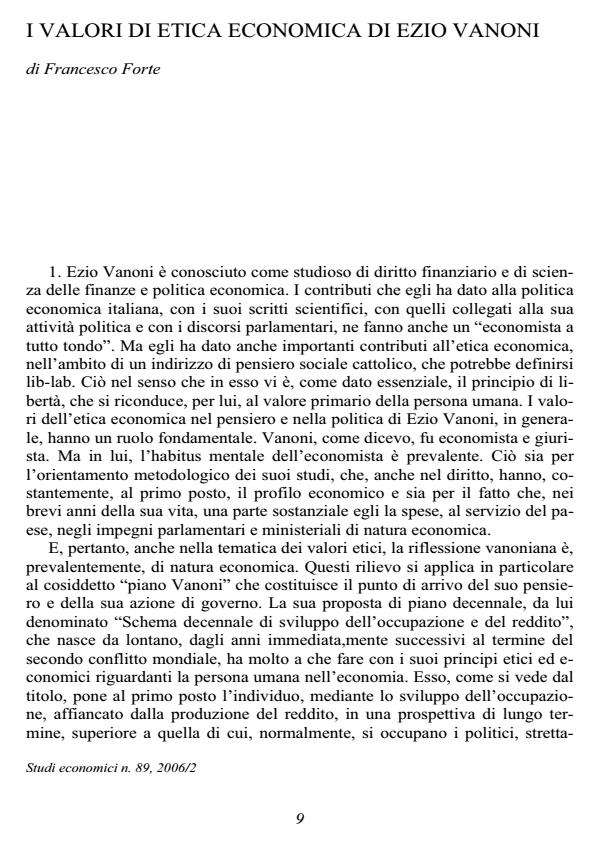I valori di etica economica di Ezio Vanoni
Journal title STUDI ECONOMICI
Author/s Francesco Forte
Publishing Year 2007 Issue 2006/89 Language Italian
Pages 19 P. 9-27 File size 86 KB
DOI
DOI is like a bar code for intellectual property: to have more infomation
click here
Below, you can see the article first page
If you want to buy this article in PDF format, you can do it, following the instructions to buy download credits

FrancoAngeli is member of Publishers International Linking Association, Inc (PILA), a not-for-profit association which run the CrossRef service enabling links to and from online scholarly content.
The paper deals with the ethical principles of Ezio Vanoni as for the relation between the individual liberties and the state and as for the two specific areas of monetary policy and of public economics. The paper considers, first Vanoni’s writings and discourses, from 1946 to 1949 when he has been member of parliament and, for few months, Minister of foreign trade and from April 1948 to February 1956, and then those (an impressive amount) that he made when has been Minister of Finance or/and Treasury and Budget. In the first part of this second period Vanoni undertook an important tax reform, introducing, among others, the general obligation of taxpayers to the annual report of their income. In the final part of the period he launched a ten year program of development of employment and income of Italy. Vanoni’s ethical principles lead him to consider essential both monetary stability and a sound credit policy, for the protection and encouragement of savings and for the development of the entrepreneurial activities, with particular regard to the small business and new initiatives. But it is in the area of taxation, that ethical principles had a paramount role in Vanoni’s theory and policy. Indeed according to him the state and the tax payers have a reciprocal moral duty. The state should constantly adapt the taxes to the ability to pay of the tax payers and should reduce their burden in exchange for an increase of tax compliance. Furthermore. the state should preferentially devote the revenues to investments and productive expenditure to foster growth and the ability to pay. On this basis, tax payer should consider that a sincere report of their incomes and revenues, is a moral duty, needed for the common welfare. Tax authorities, in principle, should trust the fiscal reports of the citizens and should not believe to them only if were able to demonstrate their wrongness. On the basis of these principles Vanoni was able to reduce substantially the tax rates, securing a constant increase of the revenues as ratio to national income. So that in a sense one can say that he applied an ethical doctrine of what is now named as the Laffer curve.
Francesco Forte, I valori di etica economica di Ezio Vanoni in "STUDI ECONOMICI " 89/2006, pp 9-27, DOI: